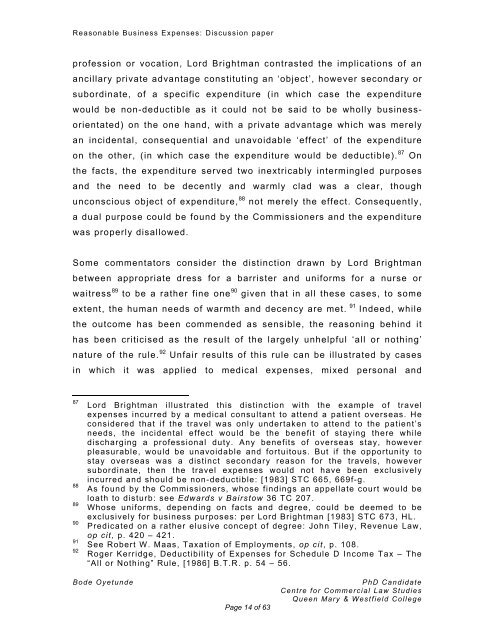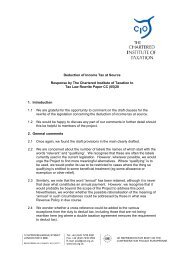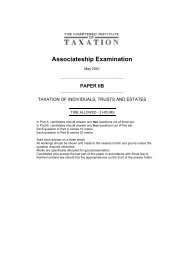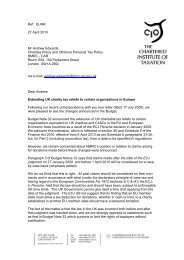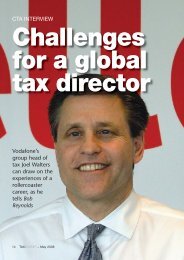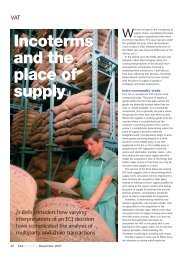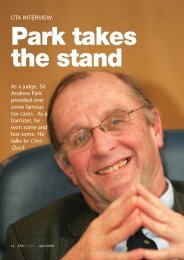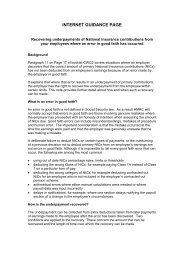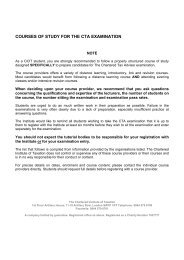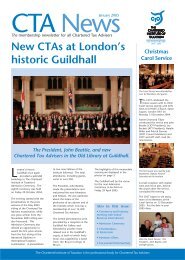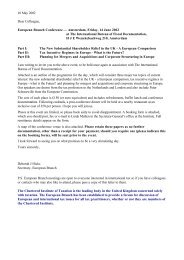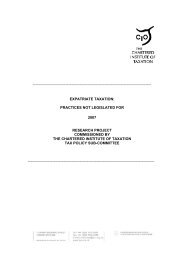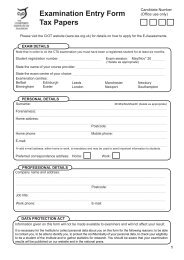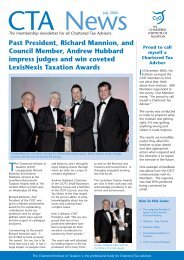Reasonable Business Expense - The Chartered Institute of Taxation
Reasonable Business Expense - The Chartered Institute of Taxation
Reasonable Business Expense - The Chartered Institute of Taxation
Create successful ePaper yourself
Turn your PDF publications into a flip-book with our unique Google optimized e-Paper software.
<strong>Reasonable</strong> <strong>Business</strong> <strong>Expense</strong>s: Discussion paperpr<strong>of</strong>ession or vocation, Lord Brightman contrasted the implications <strong>of</strong> anancillary private advantage constituting an ‘object’, however secondary orsubordinate, <strong>of</strong> a specific expenditure (in which case the expenditurewould be non-deductible as it could not be said to be wholly businessorientated)on the one hand, with a private advantage which was merelyan incidental, consequential and unavoidable ‘effect’ <strong>of</strong> the expenditureon the other, (in which case the expenditure would be deductible). 87 Onthe facts, the expenditure served two inextricably intermingled purposesand the need to be decently and warmly clad was a clear, thoughunconscious object <strong>of</strong> expenditure, 88 not merely the effect. Consequently,a dual purpose could be found by the Commissioners and the expenditurewas properly disallowed.Some commentators consider the distinction drawn by Lord Brightmanbetween appropriate dress for a barrister and uniforms for a nurse orwaitress 89 to be a rather fine one 90 given that in all these cases, to someextent, the human needs <strong>of</strong> warmth and decency are met. 91 Indeed, whilethe outcome has been commended as sensible, the reasoning behind ithas been criticised as the result <strong>of</strong> the largely unhelpful ‘all or nothing’nature <strong>of</strong> the rule. 92 Unfair results <strong>of</strong> this rule can be illustrated by casesin which it was applied to medical expenses, mixed personal and878889909192Lord Brightman illustrated this distinction with the example <strong>of</strong> travelexpenses incurred by a medical consultant to attend a patient overseas. Heconsidered that if the travel was only undertaken to attend to the patient’sneeds, the incidental effect would be the benefit <strong>of</strong> staying there whiledischarging a pr<strong>of</strong>essional duty. Any benefits <strong>of</strong> overseas stay, howeverpleasurable, would be unavoidable and fortuitous. But if the opportunity tostay overseas was a distinct secondary reason for the travels, howeversubordinate, then the travel expenses would not have been exclusivelyincurred and should be non-deductible: [1983] STC 665, 669f-g.As found by the Commissioners, whose findings an appellate court would beloath to disturb: see Edwards v Bairstow 36 TC 207.Whose uniforms, depending on facts and degree, could be deemed to beexclusively for business purposes: per Lord Brightman [1983] STC 673, HL.Predicated on a rather elusive concept <strong>of</strong> degree: John Tiley, Revenue Law,op cit, p. 420 – 421.See Robert W. Maas, <strong>Taxation</strong> <strong>of</strong> Employments, op cit, p. 108.Roger Kerridge, Deductibility <strong>of</strong> <strong>Expense</strong>s for Schedule D Income Tax – <strong>The</strong>“All or Nothing” Rule, [1986] B.T.R. p. 54 – 56.Bode OyetundePage 14 <strong>of</strong> 63PhD CandidateCentre for Commercial Law StudiesQueen Mary & Westfield College


